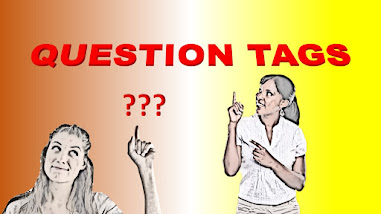Do you know how to use question tags like is he and didn't you?
Look at these examples to see how question tags are used.
You haven't seen this film, have you?
Your sister lives in Spain, doesn't she?
He can't drive, can he?
Grammar explanation
We can add question tags like isn't it?, can you? or didn't they? to a statement to make it into a question. Question tags are more common in speaking than writing.
We often use question tags when we expect the listener to agree with our statement. In this case, when the statement is positive, we use a negative question tag.
She's a doctor, isn't she?
Yesterday was so much fun, wasn't it?
If the statement is negative, we use a positive question tag.
He isn't here, is he?
The trains are never on time, are they?
Nobody has called for me, have they?
If we are sure or almost sure that the listener will confirm that our statement is correct, we say the question tag with a falling intonation. If we are a bit less sure, we say the question tag with a rising intonation.
Formation
If there is an auxiliary verb in the statement, we use it to form the question tag.
I don't need to finish this today, do I?
James is working on that, isn't he?
Your parents have retired, haven't they?
The phone didn't ring, did it?
It was raining that day, wasn't it?
Your mum hadn't met him before, had she?
Sometimes there is no auxiliary verb already in the statement. For example, when:
... the verb in the statement is present simple or past simple and is positive. Here we use don't, doesn't or didn't:
Jenni eats cheese, doesn't she?
I said that already, didn't I?
... the verb in the statement is to be in the present simple or past simple. In this case we use to be to make the question tag:
The bus stop's over there, isn't it?
None of those customers were happy, were they?
... the verb in the statement is a modal verb. Here we use the modal verb to make the question tag:
They could hear me, couldn't they?
You won't tell anyone, will you?
If the main verb or auxiliary verb in the statement is am, the positive question tag is am I? but the negative question tag is usually aren't I?:
I'm never on time, am I?
I'm going to get an email with the details, aren't I?
Lihat juga: PROCEDURE TEXT
Rumus Question Tag
Ada rumus dan aturan yang perlu kamu ingat dalam membuat question tag. Di antaranya adalah:
- Ketika kalimat pernyataan menggunakan linking verb “be” (is, am, are, was, were), maka pertanyaan pun menggunakan be.
- Jika kalimat pernyataan menggunakan primary auxiliary verb (be, do, have) atau modal auxiliary verb (will, would, may, might, can, could, shall, should) maka pertanyaan menggunakan auxiliary verb yang pertama (jika ada lebih dari satu).
- Jika kalimat pertanyaan menggunakan main verb selain linking verb “be” dan tanpa didamping auxilary verb, maka “do/does/did” akan digunakan dalam membuat question tag.
- Jika kalimat berupa larangan atau perintah, maka pertanyaan diawali dengan “will you”.
- Jika kalimat pertanyaan menggunakan subjek tak spesifik seperti nobody, everybody, no one, dan everyone, maka kamu harus menyematkan “they” dalam question tag.
- Dilansir dari study.com, jika kalimat awal negatif, question tag harus positif. Sebaliknya, jika kalimat awal positif, question tag harus berbentuk positif. Contoh:
- The weather is nice outside today, isn’t it?
- The clouds aren’t coming back, are they?
Contoh Penggunaan Question Tag
Agar lebih mudah dalam memahami materi ini, mari lihat beberapa contoh di bawah ini.
Kalimat positif
- He’s a doctor, isn’t he?
- You work in a bank, don’t you?
Kalimat negatif
- You didn’t break her leg, did you?
- She isn’t coming, is she?
Kalimat perintah atau larangan
- Don’t make me upset, will you?
- Just finish your homework, will you?
Kalimat dengan auxiliary verbs (be & have)
- They’ve done their task before they go, haven’t they?
- They weren’t here, were they?
- He had met him before, hadn’t he?
- This isn’t working, is it?
- She wasn’t in the parade, was she?
- He hasn’t gone to the store yet, has he?
- The zoo isn’t closed, is it?
Kalimat tanpa auxiliary verbs
- I said that, didn’t I?
- You don’t remember me, do you?
- She eats the apple, doesn’t she?
Kalimat dengan modal verbs (will, could, can, have)
- She will come back soon, won’t she?
- Jack can’t drive a car, can he?
- They couldn’t hear me, could they?
- You won’t tell anyone, will you?
- They have to make a film now, don’t they?
Kalimat dengan subjek tidak spesifik
- Everybody looks happy in this picture, don’t they?
- Somebody brought the guitar to my studio last week, didn’t they?
Kalimat ajakan
- Let’s watch a movie, shall we?
- Let’s go to the mall nearby, shall we?
Selamat Belajar



No comments:
Post a Comment